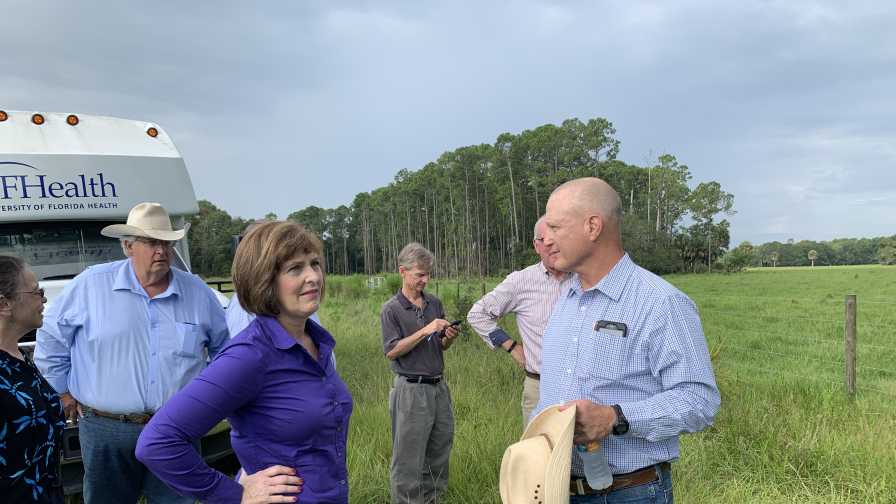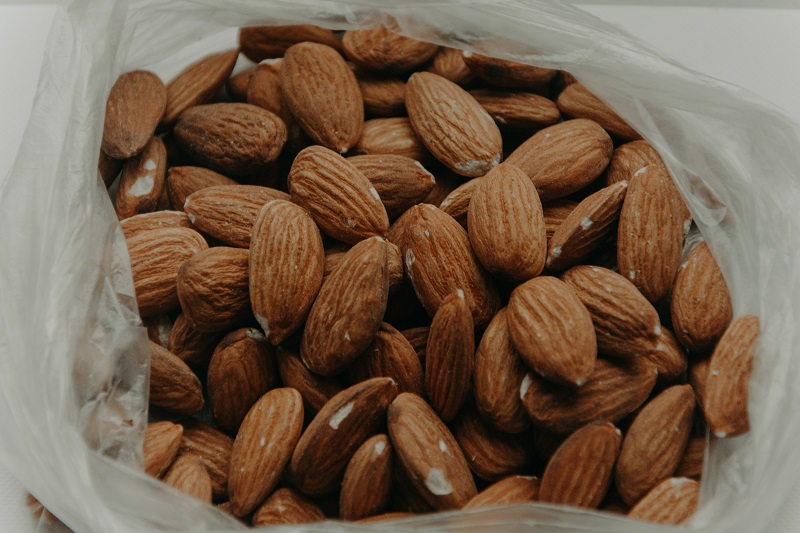Ways Florida Ag is Taking on the Climate Change Challenge

U.S. Representative Kathy Castor (left) visits with Ken Griner, co-owner of Usher Land and Timber, during a tour of the family-owned property.
Photo by Frank Giles
The U.S. House Select Committee on the Climate Crisis has been charged with delivering a report to Congress by March 2020 with innovative ideas on ways society can address climate change. Toward that goal, the Chair of the committee Kathy Castor (FL-14) recently toured the Usher Land and Timber ranch near Chiefland and participated in a Florida agriculture roundtable at the University of Florida in Gainesville.
The day’s activities were hosted by Solutions from the Land and UF/IFAS. Solutions from the Land is a non-profit organization that engages growers and agricultural leaders to advance answers to climate change and help agriculture deal with its effects.
With the help of the non-profit, a number of Florida growers have joined together to establish the Florida Climate Smart Ag working group. Ernie Shea, President of Solutions from the Land, says Florida has engaged and is taking a leadership role in the effort.
“Solutions from the Land is helping farmers redefine the core function of agriculture across the country,” Shea says. “In Florida, there is a group of about 30 progressive farmers, ranchers, and foresters that have come together to think about how they can work to meet changing societal goals, needs, and expectations when it comes to the climate in ways that are economically viable. These are some of the things we will be sharing with Rep. Castor throughout the tour and roundtable.”
A Real Ranch Making a Real Difference
One recurring theme throughout the day was recognizing the ecosystem services that Florida agriculture already is providing. A perfect example of this is the Usher Land and Timber ranch. Timber is raised and rotated among pasturelands. Cattle are raised on the pastures amid the timber. The grasslands help filter water going into the aquifer and the trees and other vegetation are great to capture carbon. With nearly 1,000 people coming to Florida per day, it also is keeping important rural lands green. The property also is a great habitat for wildlife. All of these are ecosystem services being provided by this ranch.
The ranch is owned and operated by Ken and Lynette Griner and their son Korey. They place an emphasis on working with the natural ecosystem while producing meat and timber for American and global consumers.
“If you start trying to do things that are outside the natural order, it will catch up to you pretty fast and cost you,” Ken noted during the tour of the property. “You have to work with the land provides you.”
What is the value of the ecosystem services provided by Usher Land and Timber and other farms and ranches? That’s the question scientists are trying to address to place an environmental and monetary value on these practices.
“There is this whole discussion around ecosystem system services and how we value it,” noted Rep. Castor during the tour. “Agriculture is looking for solutions to sequester carbon and be more efficient and productive. The population is going to continue to grow, so we are going to need more productive crops and livestock. Farmers who understand this are ready to take on the challenge, but right now, federal policy does not line up with what needs to be done.”
According to Dr. Jack Payne, Senior Vice President of UF/IFAS, a number of research projects are underway at the university aimed at studying the ecosystem services farms and ranches provide. He said there might be a day when producers are compensated for making additional outlays to retain soil carbon and mitigate climate change.
“If we are going to be sustainable, we have to keep these operations profitable,” he noted.
American agriculture is helping to capture carbon. Bill Hohenstein, USDA’s Director of Energy and Environmental Policy, reported on key findings from a report recently released by the Intergovernmental Panel on Climate Change (IPPC) during the roundtable session. The report indicated that while global figures attribute some 21% to 23% of net greenhouse gas emissions (GHGs) to agriculture and land use, different countries face different challenges.
“In the U.S., we have quite a different story,” Hohenstein said. “Agriculture is just under 9% of U.S. greenhouse gases. Managed forests offset about 11% of U.S. GHGs, meaning that, in the aggregate, the land system in the U.S. is a net (carbon) sink relative to other sources.”
Feeling the Impacts
Multiple growers spoke during the day’s events on how they are seeing climate change impact their businesses and environment. The Usher ranch has experienced massive rainfall events the past two years that are not related to hurricanes.
Lynette Griner reported their ranch received two years’ worth of rain in eight months last spring and summer. “We had 63 inches in 82 days and about 100 inches in total.”
In the week after the tour, Griner reported the property had experienced another 25 inches of rain in just a few days.
Other growers reported the lack of winter and how that is impacting variety selections and increasing insect pressure in crops.
“Growing up in Central Florida in the 1970s and 1980s, you could almost mark your calendar that by October 5 we would have a cooldown and the air would start to dry out,” noted Gary Wishnatzki, a third-generation strawberry and blueberry grower from Plant City. “That has changed dramatically. Those cooldowns don’t come now well into November.”
He also noted the unusually warm fall experienced last season caused big problems for strawberry growers who planted their crops early to get ahead of Mexican import competition.
Rep. Castor said she’s taking what she learned in Florida back to D.C. to work on the climate change proposal. She added it is important that agriculture’s voice is heard in the debate. As one tour attendee noted: “If you are not at the table, you are on the menu.”
“It is has become very clear to me in my travels that the American people are hungry for a bipartisan solutions to climate change,” Castor said. “And, they are hungry for solutions that come from agriculture. There is nothing like sitting down and talking solutions with growers here in Florida who have been at it for their lifetimes.”










